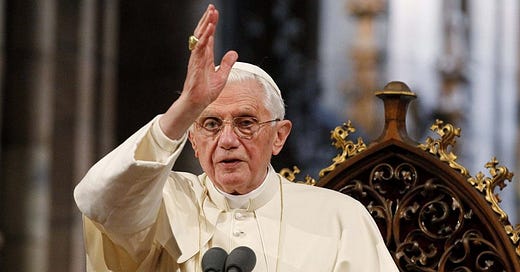Can a Priest Give a “Non-Liturgical Blessing”?
Official popesplainer Andrea Tornielli says yes; but Catholic theology says no
An article at Vatican News by Andrea Tornielli has been making the rounds: a magnificent example of someone pathetically trying to build an ex post facto case for decisions that had already been made for quite different reasons. A development in search of a doctrine, you might say. Of course, I am referring to Fiducia Supplicans, which its proponents aren’t sure whether to present as saying something new, or as repeating something kind of old, or some unintelligible combination of old and new. Perhaps it depends on whether it’s a leap year or not.
It’s amazing to me that people can be so easily distracted from the real issues.
Did Ratzinger anticipate Fernández?
Joseph Ratzinger back in 2000—funny, isn’t it, how they only dug up this obscure text now and failed altogether to mention it in Fiducia Supplicans—drew a distinction between “liturgical and non-liturgical blessings.” So, runs the article, this new document is (you guessed it) an application of Ratzingerian wisdom. The hermeneutic of continuity, and all that.
The fact that something was said by Ratzinger in 2000 and is now being said (well, sort of) by Tucho Fernández doesn’t actually make much difference if the distinction itself is dubious. In short: I’m afraid that on this point, both of them are mistaken, though Tucho is more to be blamed because of the cause in the service of which he is groping for excuses.
We should reject this idea that a priest can give a blessing that is not an exercise of his priesthood and therefore, as such, also involves the Church and is proto-liturgical if not formally so. Otherwise it isn’t a priestly blessing but a Hallmark greeting.
The divorce between the person of the priest and his formal exercise of priesthood is very much tied to the error in recent decades of seeing the priesthood as a job, like being a fireman or a businessman, rather than an ontological state of ministerial conformity to Christ the High Priest that makes a priest intrinsically different from a layman (as per Lumen Gentium, among countless other sources). A priest is not a priest from 9 to 5; he’s a priest around the clock, and, indeed, for all eternity, as a baptized Christian is a Christian for eternity. His hands and voice, in blessing, are the hands and voice of Christ blessing, and can only bless that which God blesses.
Quite simply: a blessing is a blessing is a blessing, regardless of whether a priest takes 15 seconds or 15 minutes, wears a stole or a hoodie, reads from a liturgical book or freewheels it. If it is not a blessing given on behalf of Christ the High Priest and as an agent of His Church, and so, already in some sense liturgical (since “liturgy” means “the work of one on behalf of many”), then it is vain and superstitious speech.
Keep reading with a 7-day free trial
Subscribe to Tradition and Sanity to keep reading this post and get 7 days of free access to the full post archives.





